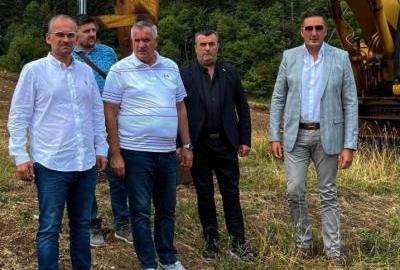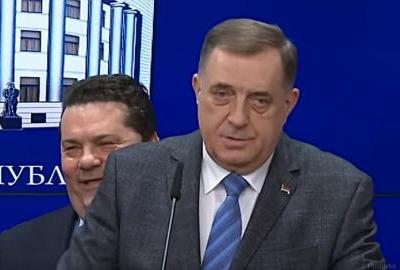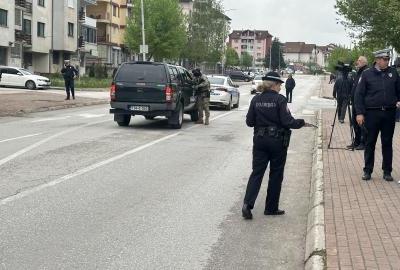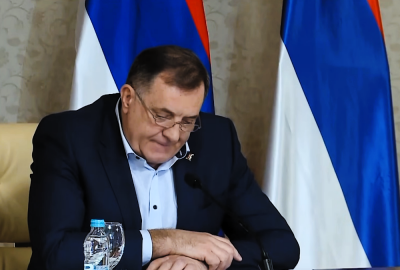Žurnal in English
The masks have finally slipped: The role of Russia in a destructive offensive of Milorad Dodik
Russian Federation has entirely unveiled its role in this region by providing support to Milorad Dodik and Dragan Čović in the latest endeavors to destabilize Bosnia and Herzegovina. Of course, the President of Serbia, Aleksandar Vučić, is doing a good portion of the “dirty work”. Essentially, Dodik, Čović and Vučić are mere marionettes to Russia that uses them to halt the NATO integration of BiH and its prosperity.
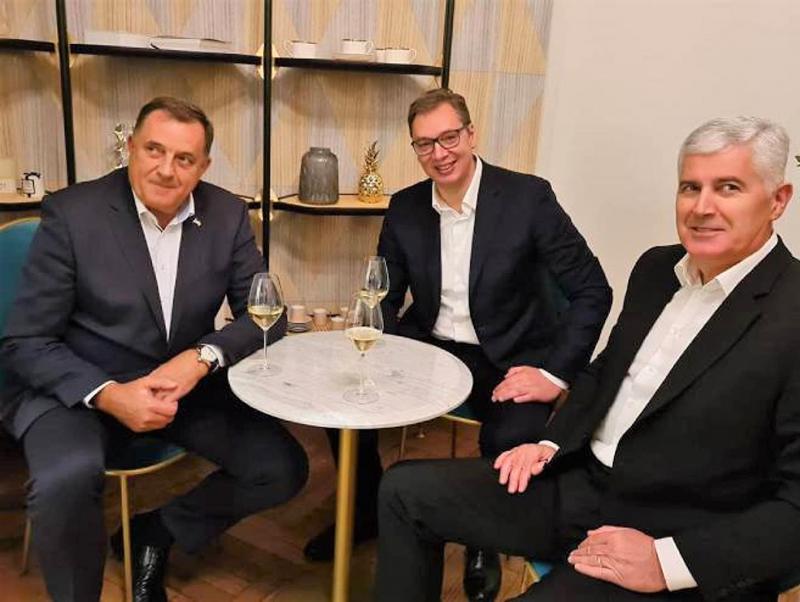
In the second part of this year the SNSD leader, Milorad Dodik, has commenced a political pressing with uncharted consequences for Bosnia and Herzegovina. His proclamation of “an independent Republika Srpska in the Dayton’s Bosnia and Herzegovina” primarily entails withdrawal of the consent to the establishment of the BiH Armed Forces, the BiH Indirect Taxation Authority, the High Judicial and Prosecutorial Council, the BiH Intelligence-Security Agency and other institutions that, according to his interpretation, are not foreseen by the Dayton Agreement. The first concrete move was revocation of the BiH Agency for medicinal products’ jurisdiction, with a six-month postponement period.
The formal cause was the decision of the former High Representative, Valentin Inzko, to use the powers in the last days of his term to “supplement” the Criminal Code with provisions by which denial of genocide in Srebrenica becomes punishable, and the additional reason being the decision of the BiH Constitutional Court that forests in BiH are property of the state, and not of the entities. However, it is certain that Dodik would not embark on his political adventure without consent of the Russian Federation, which when it comes to Bosnia and Herzegovina has been playing its usual “game” for the last 15 years - calling for the preservation of the country’s integrity while giving full support to the independence of Republika Srpska entity.
“It is very important that each country determines its own destiny, and it is also rational to be suspicious of people from outside who want to shape your destiny. I believe that great powers strategically do not want to change the system, but rather to destabilize it, portraying themselves as an arbitrator of change and that is extremely dangerous regardless of the country in question. Therefore, I believe that attention must be paid to the people who are trying to destabilize your country and then offer help in stabilizing it”, said professor Margaret Pierce, who directly experienced the methods of Russian influence on events in a certain country while living in Armenia, for Žurnal.

Margaret Pierce
The Russian Ministry of Foreign Affairs voiced the concerns about tension that generates potential threat to stability and security in Bosnia and Herzegovina and the Balkans. It is again the causative agent being concerned about the escalation of problems. Of course, Russia has clearly taken sides.
“From our side we emphasize the unquestionable unacceptability and an obvious anti-Dayton nature of the policy of demonization of the Serb people in Bosnia and Herzegovina pursued by certain internal and external forces with perseverance worthy of a better use. We consider it necessary to warn that such a provocative line leads to the most negative consequences. The responsibility will be borne exclusively by its creators. Threats to use unilateral sanctions are illegal and unworthy in the sphere of international relations”, stated the MoFA of Russia.
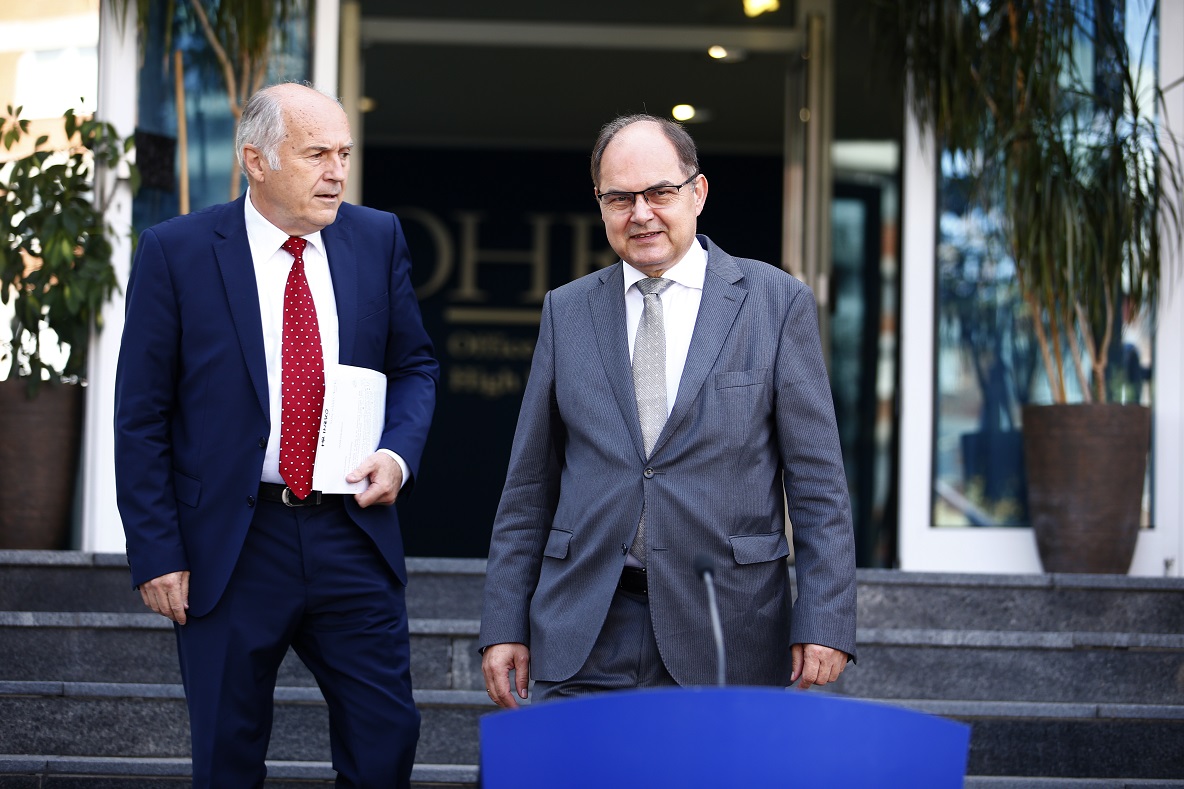
Valentin Inzko and Christian Schmidt
Dodik has officially agreed to extend the EUFOR’s mandate in BiH, but he is emanating the Russia’s prior consent, which in turn seeks denial of the mandate to the new High Representative in BiH, Christian Schmidt, or, as a compromise solution, abolishment of the Bonn powers altogether. The first week of November, when Schmidt is to deliver a report to the UN Security Council, will show the results of political battle of Russia with the USA and the EU countries that want to sanction Dodik and his politics. A special question that arises is how much overdue are concrete moves, coming after years of more or less open threats that the Republika Srpska will move towards independence, in or outside Bosnia and Herzegovina.
A friend of all presidents of Serbia
Milorad Dodik has joined the undisguised service of the interests of Russian Federation and Serbia fifteen years ago. Following his return to power in Republika Srpska in early 2006, SNSD i.e. Dodik had made two major economic concessions to its mentors. In the last days of that year the RS National Assembly and the RS Government consented to the privatization of Republika Srpska’s oil industry, which subsequently came into possession of the Russian company NeftGazinKor, and the sale of Telekom Srpske, whose 65% of the state capital was sold to Telekom of Serbia, which was reported by Žurnal in detail.
Vojislav Koštunica, an admirer of both the Russian and the Serbian Orthodox Church’s politics, was the president of the Serbian Government at that time.
“As the President of the Social Republic of Yugoslavia, and subsequently as the two-term prime minister of Serbia, Vojislav Koštunica led the politics of getting attached to Russia, which had become particularly evident during 2006 when the thesis on Serbia’s neutrality with full reliance on Russia was publicly presented. It is then that he had abandoned the strategy on Serbia’s approximation to the EU, which ended in his rejection of the EU Stabilization and Association Agreement in December of 2007. The argument he used for such a decision was the EU conditioning Serbia to full cooperation with the Hague Tribunal in Hague. It coincided with Russia’s return to the international stage as an important energy power, wherein Serbia had just become an important asset”, wrote Sonja Biserko in the 2008 text “The role of Russia and its influence in the Balkans”.
During Koštunica’s term, the Russian company Gaspromnjeft is buying the Oil Industry of Serbia for less than a proper price under the economic parameters. Russia connected Koštunica and Dodik not only with economic pressure on Serbia and BiH through its entity Republika Srpska. It posed no problem to Dodik, as he has already earned the reputation as the friend of all presidents of Serbia, regardless of political beliefs, starting with Slobodan Milošević and all the way to Aleksandar Vučić.
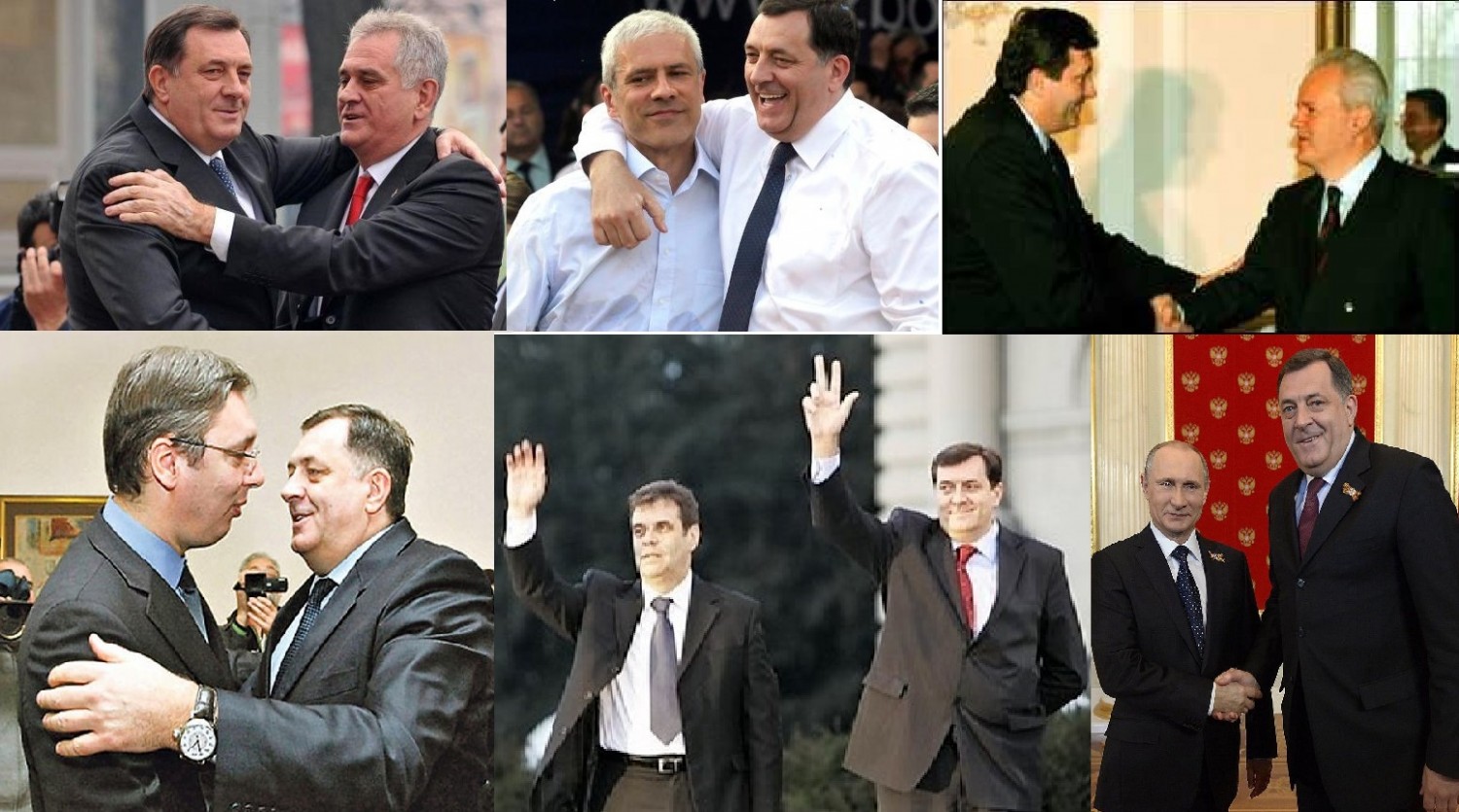
There are some interpretations that it was precisely Koštunica who, as a doctor of juridical science, once removed from the faculty as the assistant professor for criticizing the Constitution of the SFRY, instructed Dodik on how to derogate state institutions. “Forget the spirit of Dayton, the law doesn’t recognize that, stick to the letter of the “Agreement”, was Koštunica’s message that Dodik is starting to implement in practice, immediately getting the support of Russia.
“Russia advocates strict implementation of the Dayton Agreement and believes that the international community is obligated to entirely respect the Dayton Agreement, not allowing any change to the organization established in the Dayton in any way other the one set forth in the Constitution,” the Ambassador of Russia to BiH at that time, Konstantin Shuvalov, started to more openly elaborate its politics.
Encourage by these statements, Dodik then starts publicly saying that Republika Srpska should be given back all jurisdictions that were transferred to the state level. The High Judicial and Prosecutorial Council of BiH was his first target. According to the writing of Milan Ljepojević in the book “Dodik, the guardian of Srpska” the then-president of RS, Milan Jelić, had requested the government of this entity to initiate a procedure before the RS Constitution Court for the review of constitutionality of all laws by which the jurisdictions were transferred from the entities to BiH.
Dodik also recognizes the “potential” of HDZ BiH, namely the potential of the party’s leader Dragan Čović, to whom he had already in 2007 signaled that he has nothing against a third entity in BiH.
“I am ready to support the realistic demands of the Croat political representatives, conditioned only by untouchability of Republika Srpska”, had been Dodik’s “bait” for an alliance with HDZ and getting this party under the “Russian foot”.
The new ambassador of Russian Federation to BiH at that time, Aleksandar Bocan Harcenko, starts a blatant campaign by which Russia is seeking termination of Bonn’s powers to the High Representative and transformation of the OHR into the EU Special Representative Office.
Dodik uses lethargy of the international community
Russia is founding its power internationally, particularly in Europe, on gas and oil supply, which is best shown by the current energy crisis. Following suspension of SNSD from the Socialist International, Dodik goes to Moscow at the convention of “United Russia”, party of Vladimir Putin, as to formalize the cooperation that will be reaffirmed in the years to come and expanded to HDZ BiH-
“Serbs are not the only ones whom Russia is attempting to influence. Russia has been for many years now actively support Croat claims of discrimination and their demands for a third administrative entity. Dragan Čović, the former member of the BiH Presidency and current leader of the Croat Democratic Union (HDZ), continues to court Russian officials who have been support creation of a third entity for a long time already and are opposing the accession of BiH in NATO”, wrote the magazine Foreign Policy at the end of 2020 on the significance of Russian influence in Bosnia and Herzegovina, criticizing the European Union and the United States of America for insufficient involvement in political and reform processes in BiH.
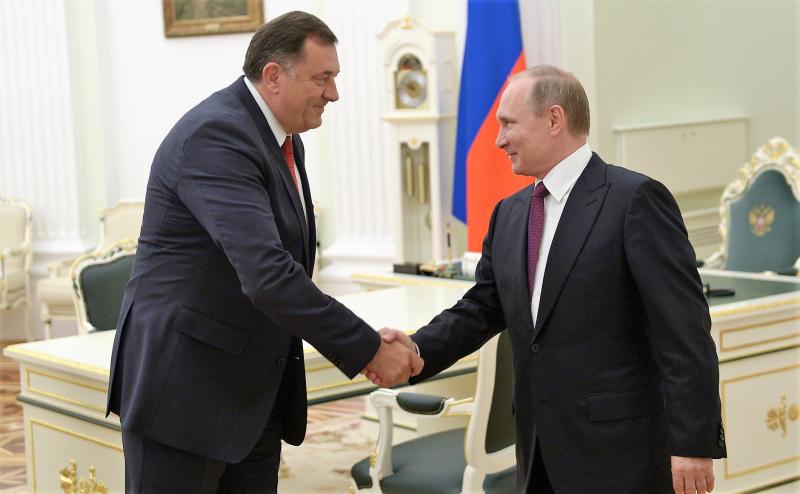
Milorad Dodik and Vladimir Putin
Activities on the route Moscow-Belgrade-Dodik-Čović are getting synchronized. Nothing is random. For example, Dodik goes to visit President of Croatia, Zoran Milanović just before the visit of the Russian Minister of Foreign Affairs, Sergey Lavrov, at the end of 2020, and then takes Dragan Čović to visit Aleksandar Vučić.
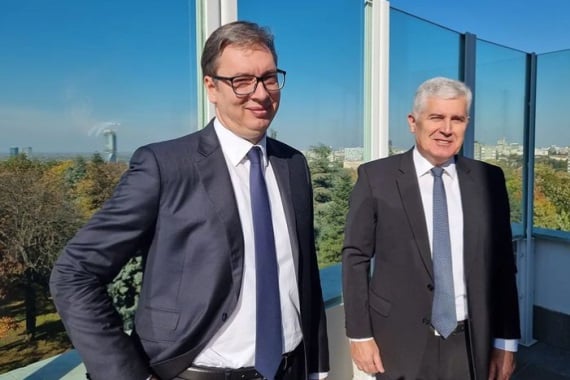
Aleksandar Vučić and Dragan Čović
Everything is repeated a year later, at the time of newest offensive on the sovereignty of Bosnia and Herzegovina that is being carried out by Dodik and Čović with the support of Russia – Milanović meets Dodik in Zagreb again, and Vučić welcomes Čović. At the same time Russia is still refusing to acknowledge legitimacy of the High Representative, Christian Schmidt, who is called “alleged High Representive” in the press release issued by the Russian Embassy to BiH.
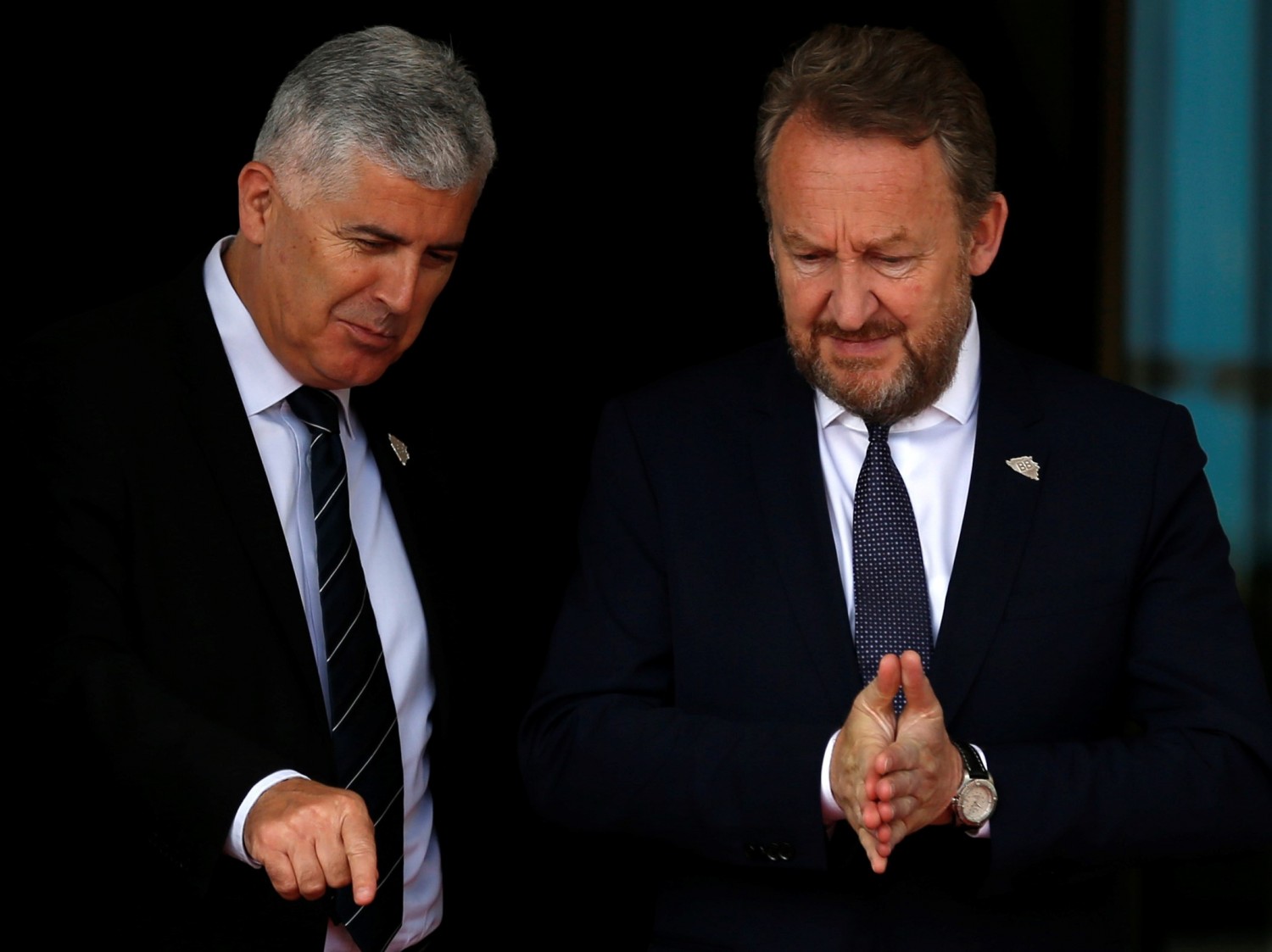
Dragan Čović and Bakir Izetbegović
The leader of the Party of Democratic Action, Bakir Izetbegović, who is announcing a tour and encounters with the BiH diaspora in the midst of a political crisis, is currently preoccupied by the new election law, which HDZ BiH, with support of Milorad Dodik, is trying to set as one of the conditions for stabilization of political circumstances.
“The moment when Dodik agrees with something you know that Russia is behind it. Republika Srpska and Serbia are nothing more than proxies, they are fighting for the interests of Russia. Russia is an old and ancient country and it knows how to play. Its only goal is to destabilize, hoping that in the long run BiH will collapse on its own. Russia continues the game, which is not so visible as it is played by others, certain emissaries who have come and go primarily as a template of nationalist Croatia,” is the opinion of sociologist Sead Pašić.
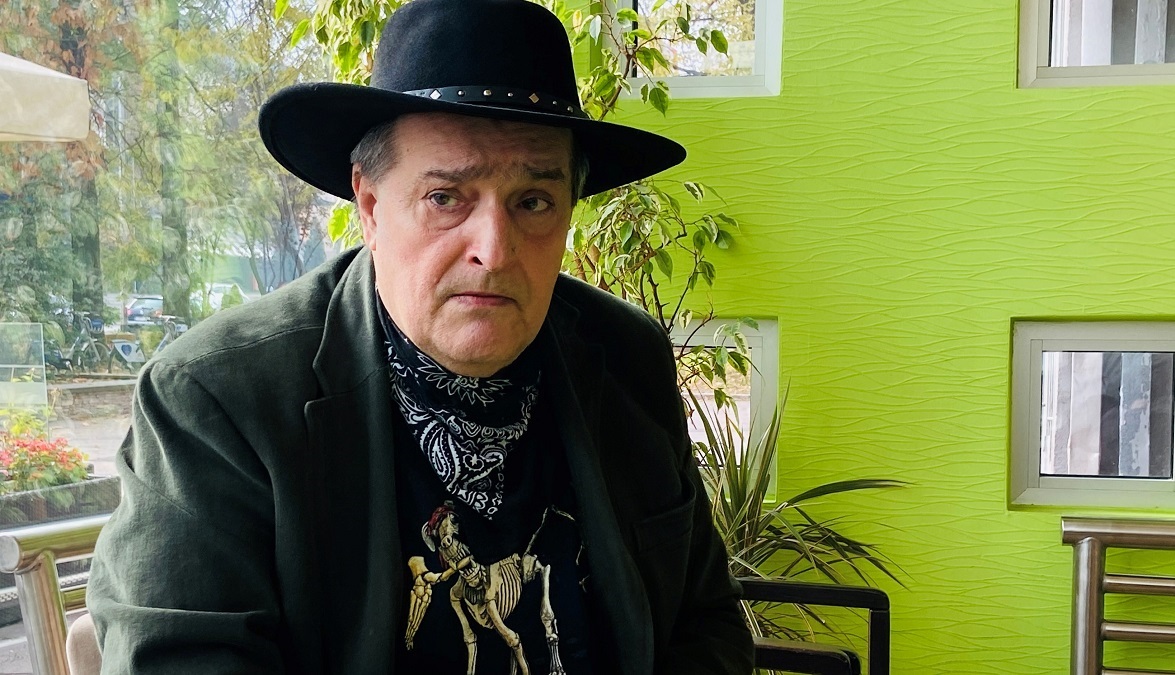
Sead Pašić
While the President of Croatia, Zoran Milanović, is persistently giving legitimacy to the Russian “player” Dodik by agreeing to meet him in Zagreb, the Croatian Security and Intelligence Agency (SOA) had in its 2020 Report marked Russia as a factor of instability in this region.
“Cyber-attacks, particularly the ones from Russia and China, can be detrimental to Croatia, while the concept of the so-called “Serb world” promoted by Serbia and supported by Russia additionally destabilizes the Western Balkans”, reads the report.
Futile earlier warnings
In a series of texts produced over the past years Portal Žurnal wrote about the Russia’s growing influence in BiH, from its influence on the judicial system, the process of amending the election law, and inevitably the security and intelligence system, then the influence realized through humanitarian organizations and various associations, all aimed at (also) maintaining economic interests such as opening up the medicines market even for untested medicines from Russia.
Srđan Sušnica, lawyer, culturologist and political analyst from Banja Luka, has been warning that Republika Srpska’s regime has been preparing a conflict under supervision of Russia and Serbia with the main goal of taking over all jurisdictions of the state. In the meantime, Sušnica had to leave BiH with his family due to threats.
“A synchronicity between Dodik’s provocative and destabilizing moves in BiH and his consultations with the Russian officials has been existing for years already. The actions of Dodik’s regime concerning selection of the new High Representative in BiH are thus entirely part of Russia’s efforts to discredit and to passivize the role and importance of the OHR and the High Representative, but also of the Western stakeholders in BiH, primarily the NATO and the USA. (…) Dodik is a henchman and a representative of politics of Kremlin and formal Belgrade. Both the Russian ambassador to BiH and president of Serbia have just recently similarly commented Dodik’s statements that he will not shy away even from a violent rebellion to “give” army and other national jurisdictions of BiH back over to RS. (...) All the support to Dodik’s attacks to the constitution and peace in BiH serves to create “new normality” and to impose “new agreements”. Kremlin and Belgrade see the entity RS as a “state”, and BiH as a union of two states”, commented Sušnica recently for the Belgrade daily “Danas”.
There is no doubt that Russia has done everything to keep the influence on political events in Bosnia and Herzegovina directly or through Serbia, which in practice means maintaining or increasing the tensions that even have led to the talks about new armed conflict in this territory. The situation in the field remains the same all the time.

The current Russian Ambassador to BiH Igor Kalabuhov attends a ceremony in the village Ritešići, near Doboj, giving the support to construction of Serbian-Russian Spiritual Center and a monastery of St. Matrona of Moscow about which Žurnal wrote. Russia is evidently continuing what it has started years ago with the wholehearted assistance of Aleksandar Vučić, Milorad Dodik and then Dragan Čović, which is actually doing everything to prevent Bosnia and Herzegovina in its intention to become member of the NATO. Everything else is irrelevant.
________________________________________________________________________________________________________
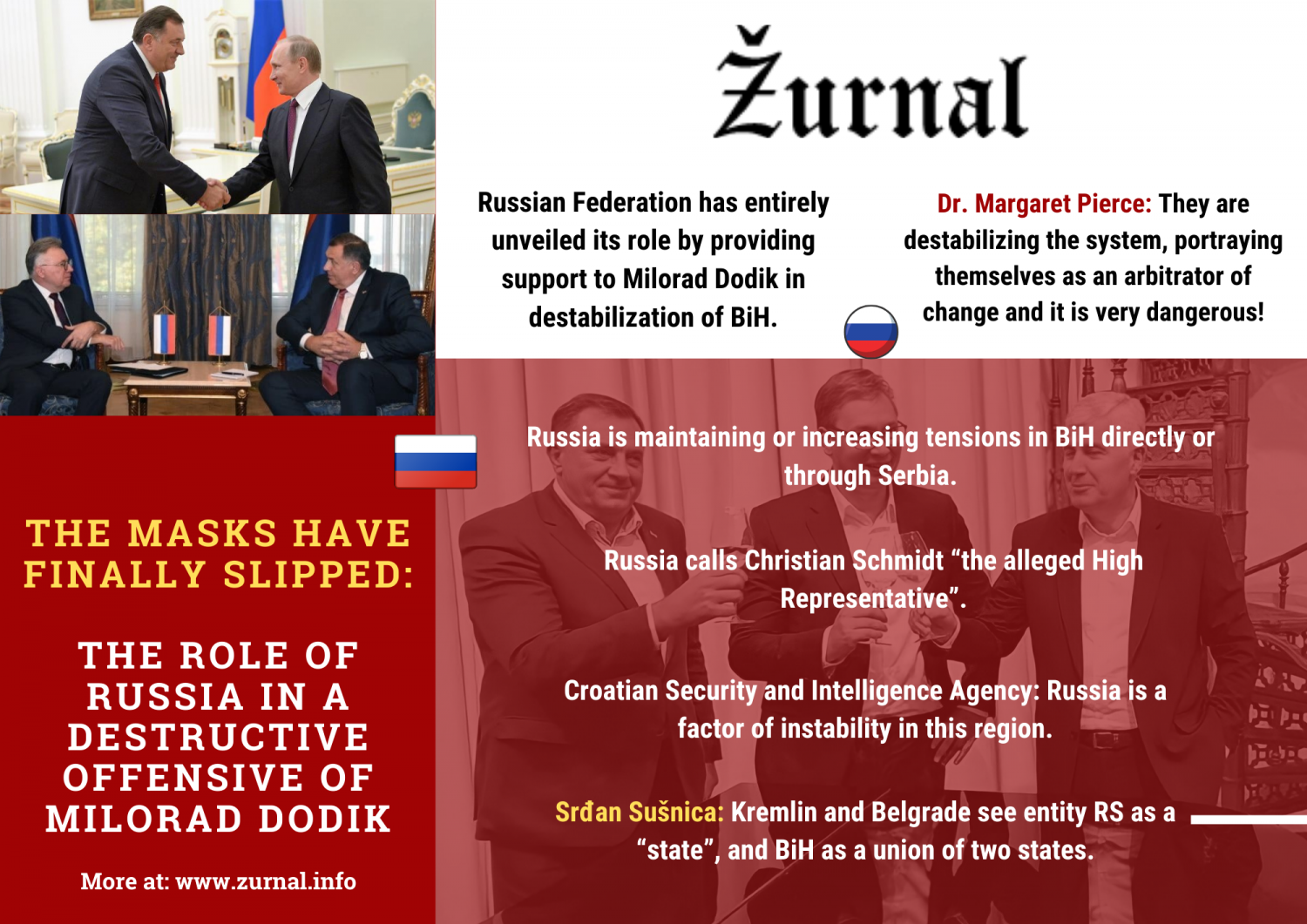
(zurnal.info)





